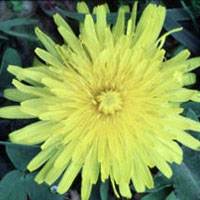Fit and Fast Recipes
Dandelion
 © Steven Foster
© Steven FosterParts Used & Where Grown
Closely related to chicory, dandelion is a common plant worldwide and the bane of those looking for the perfect lawn. The plant grows to a height of about 12 inches, producing spatula-like leaves and yellow flowers that bloom year-round. Upon maturation, the flower turns into the characteristic puffball containing seeds that are dispersed in the wind. Dandelion is grown commercially in the United States and Europe. The leaves and root are used in herbal supplements.
- Reliable and relatively consistent scientific data showing a substantial health benefit.
- Contradictory, insufficient, or preliminary studies suggesting a health benefit or minimal health benefit.
- For an herb, supported by traditional use but minimal or no scientific evidence. For a supplement, little scientific support.
Our proprietary “Star-Rating” system was developed to help you easily understand the amount of scientific support behind each supplement in relation to a specific health condition. While there is no way to predict whether a vitamin, mineral, or herb will successfully treat or prevent associated health conditions, our unique ratings tell you how well these supplements are understood by the medical community, and whether studies have found them to be effective for other people.
For over a decade, our team has combed through thousands of research articles published in reputable journals. To help you make educated decisions, and to better understand controversial or confusing supplements, our medical experts have digested the science into these three easy-to-follow ratings. We hope this provides you with a helpful resource to make informed decisions towards your health and well-being.
This supplement has been used in connection with the following health conditions:
| Used for | Amount | Why |
|---|---|---|
Constipation | Refer to label instructions | The bitter compounds in dandelion leaves and root are also mild laxatives. |
Edema | Refer to label instructions | Dandelion leaves have diuretic effects that may be comparable to the prescription diuretics used to treat edema. |
Indigestion, Heartburn, and Low Stomach Acidity | Refer to label instructions | Dandelion acts as a digestive stimulant and may be helpful for indigestion. |
Pregnancy and Postpartum Support | Refer to label instructions | Dandelion is a tonic herb, believed to strengthen or invigorate organ systems. A rich source of vitamins and minerals, it promotes urine and bile flow and helps with the common digestive complaints of pregnancy. |
Traditional Use (May Not Be Supported by Scientific Studies)
Dandelion is commonly used as a food. The leaves are used in salads and teas, while the roots are sometimes used as a coffee substitute. Dandelion leaves and roots have been used for hundreds of years to treat liver, gallbladder, kidney, and joint problems. In some traditions, dandelion is considered a blood purifier and is used for conditions as varied as eczema and cancer. As is the case today, dandelion leaves have also been used historically to treat water retention.
Copyright © 2026 TraceGains, Inc. All rights reserved.
Learn more about TraceGains, the company.
The information presented by TraceGains is for informational purposes only. It is based on scientific studies (human, animal, or in vitro), clinical experience, or traditional usage as cited in each article. The results reported may not necessarily occur in all individuals. Self-treatment is not recommended for life-threatening conditions that require medical treatment under a doctor's care. For many of the conditions discussed, treatment with prescription or over the counter medication is also available. Consult your doctor, practitioner, and/or pharmacist for any health problem and before using any supplements or before making any changes in prescribed medications. Information expires December 2026.








